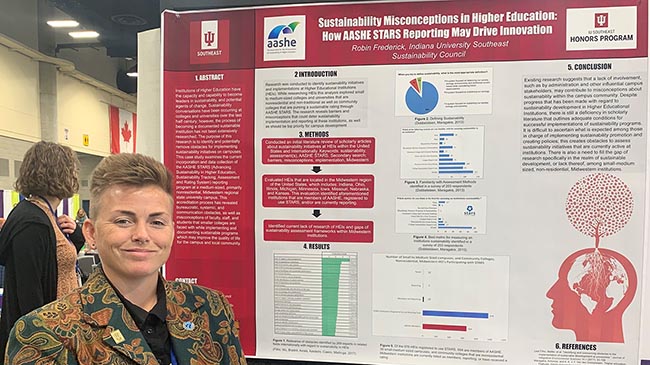By Steven Krolak
(NEW ALBANY, Ind.)–Fresh from wrapping up a successful inaugural Sustainability Month at IU Southeast, Robin Frederick has taken the campus’s green commitment to another level.
Frederick, an Honors Program student and chair of the IU Southeast sustainability council, presented the results of her research at the recent national conference of the Association for the Advancement of Sustainability in Higher Education (AASHE) in Spokane, Washington.
Frederick’s poster presentation explored some of the obstacles to sustainability on campuses. These include a lack of funding, awareness, involvement, administration support, and engagement.
“Sometimes you see an incapacity to define what sustainability is to a specific campus, an inability to understand current initiatives and a failure to recognize opportunities,” Frederick said.
Frederick believes that reporting on all sustainability-related efforts via the Sustainability Tracking, Assessment and Rating System (STARS) can jump-start a broader and more integrated awareness of current efforts and drive future innovation at IU Southeast.
STARS is a self-reporting framework for colleges and universities to measure their sustainability performance. IU Southeast is an AASHE member and a STARS participant.
“STARS certification will allow us to make sustainability a bigger part of our strategic plan and budget, gain international recognition for our efforts, and help us generate new ideas while engaging our community,” Frederick said. “Most importantly it will allow us to create a baseline against which we can measure our performance both internally and in comparison peer institutions.”

To these ends, Frederick has created a STARS Student Council comprised of half a dozen students who assist her in gathering a large amount of data on everything from academics and administration to facility operations and planning. Her goal is to submit reporting for possible STARS rating by the beginning of the new year.
In many ways, Frederick’s current work at IU Southeast is a new application of the skills she demonstrated during her previous involvement with the Transit Authority of River City (TARC), where she created the first-ever carbon footprint baseline for the entire public transit system of Louisville.
While everyone wants to be part of the solution to environmental challenges, it is only by understanding how the organizations and systems of which they are a part–such as governments, corporations, universities–function, and by quantifying their impact, that the individual’s desire for improvement can be scaled up to really make a positive difference.
During Sustainability Awareness Month, Frederick put together a book display of environmental classics in the IU Southeast Library, gathered ecology-themed art pieces by IU Southeast graduate and local artist Amber Pappas and artist Al Gorman, and even created several displays of her own.
These and other actions drew attention to ecological challenges, but also highlighted the sustainability work already underway on campus.
Over the last several years, IU Southeast has made huge strides in greening its operations, with investments ranging from the implementation of a single-stream recycling program to energy management guidelines that reduce the campus carbon footpring while also saving money.
From new efficient natural gas HVAC systems with computerized energy management controls, energy efficient windows and doors to low-flow irrigation and restroom fixtures, landscaping with native species, and the introduction of LED lighting indoors, there are many visible signs that a culture of improvement is gaining momentum at IU Southeast.
Academically, the Sustainability and Regeneration degree program is the most visible sign of faculty commitment, while the administration, led by Vice Chancellor for Administrative Affairs Dana Wavle, continues to recognize and advocate for green initiatives.
For Frederick this is all positive, and she is working to improve student understanding and involvement at IU Southeast, as she has seen at other campuses.
“Students today are taking the lead to create change at their institutions of higher education, be it in curriculum, policies and practices, facilities and student services, or campus climate and institutional policies,” Frederick said. “And these institutions play a crucial role in providing opportunities for students to learn about sustainability challenges and in preparing them for employment in an economy that is continually adopting sustainable alternatives.”


